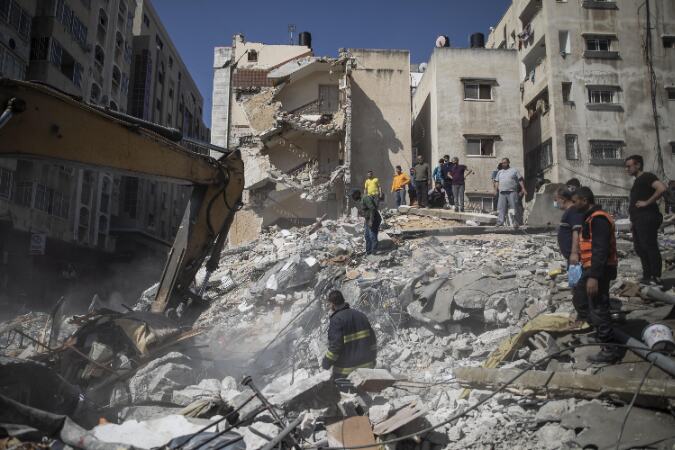No end to war

After 11 days of brutal fighting, the latest round of hostilities between Israel and Palestine appears to have come to an end. An Egypt mediated ceasefire between Hamas and Israel has been negotiated. For the first time in over a week, Palestinians poured out onto the streets, embracing each other and celebrating in the midst of a ruined city. In 11 days, Israel's bombardment of Gaza has left at least 232 Palestinians dead and thousands injured. Tens of thousands have been displaced as Israel brought down over 180 residential towers and other buildings. In Israel, Hamas rocket strikes have killed at least twelve, including one Indian national in the southern Israeli city of Ashkelon. As is often the case, both sides targeted civilian targets during the course of the conflict. For now, this ceasefire seems tentative, fragile even. Even as Palestine celebrates an end to the 11 days of horror, Hamas leaders say that they have 'their hands on the trigger' and that they will continue to grow the capabilities of their group. Nevertheless, US President Joe Biden is eager to sell the ceasefire as a significant moment. In one stroke, Biden has not only promised to help rebuild Gaza but has also promised to replenish the Israeli Iron Dome defence system. In doing so, Biden continues walking an unusual path in which the US resolutely stands by Israel no matter the cost while also somehow supporting a two-state solution. Throughout these 11 days of conflict, the US has been instrumental in Israeli efforts to keep foreign interference out. The US has used its privilege as a permanent member of the UN Security Council to essentially keep the UNSC from making a unified statement against the conflict. Even as the other 14 members expressed their support for making a statement for a ceasefire, the US opposed any such statement as 'counter productive' to bringing peace to the region. As an international stance, the US 'firmly' supporting Israel is not a new thing. Support for Israel is a largely bipartisan effort in the US with support from both the Democrats and Republicans. What was different this time was that the progressive wing of the Democratic Party was less willing to blindly support Israel's 'right to defend itself'. As encouraging as this resistance was, it did not prevent the US from blocking international pressure on Israel and it has not yet prevented the US from selling more weapons to Israel. The fact that the US was able to singlehandedly stonewall the international community from intervening in the conflict should lend credence to the demand for overhauling the UNSC. The privilege of veto is a relic of bygone days that should have no business existing in these multipolar times. But even beyond that, there is a need to recalibrate the US and larger international response to the Israel-Palestine question. The international conversation on this issue has become far too polarised, far too intent on assigning blame than finding a solution to the age-old problem of finding a path to co-existence. Indeed, even in Israel and Palestine, the two-state solution and idea of co-existence seem to have lost steam. There is a complete lack of faith in both sides regarding the reality of this solution. The Palestinian leadership has mostly stopped mentioning it. In Israel, the political climate is leaning towards complete annexation of the occupied West Bank. This was the case before this conflict. Now, the Oslo Accord that presented the possibility of a two-state solution is more distant than ever. This is where any international effort to bring long-lasting peace to the region should begin. This isn't a question of assigning blame, this isn't about deciding whose tragedy is worse and this certainly isn't about deciding whose historical claim to the region is better. It is about recognising that the whole situation is tragic and that co-existence is the only long term solution to this cycle of violence. Otherwise what good is this ceasefire? Tensions between the Israeli community and the Palestinians in the occupied West Bank remain high. Israel is also unlikely to reconsider its controversial settlement policy. In fact, none of the contributing factors to this 11-day conflict have been addressed and are likely to change. It was for this reason that there are voices, even within Israel, that question what exactly Israel achieved in these 11 days except for more death and resentment. The Hamas will eventually rebuild its capabilities, its Iranian benefactors will see to that. Israel's attack has only pushed the group back for the time being. The long-lasting effects of Israel's war on Hamas will be felt by the people of Gaza. Already a city with poor public infrastructure and rampant poverty, the massive destruction of infrastructure will be an added burden they cannot afford to bear. This is before getting into any discussion of how this conflict could have aggravated an already serious Covid situation in Gaza where the only Covid testing facility was destroyed in an Israeli airstrike. To conclude, this ceasefire is not nearly enough. More needs to be done and not just by the failing leadership shown by the two sides involved in the conflict.



